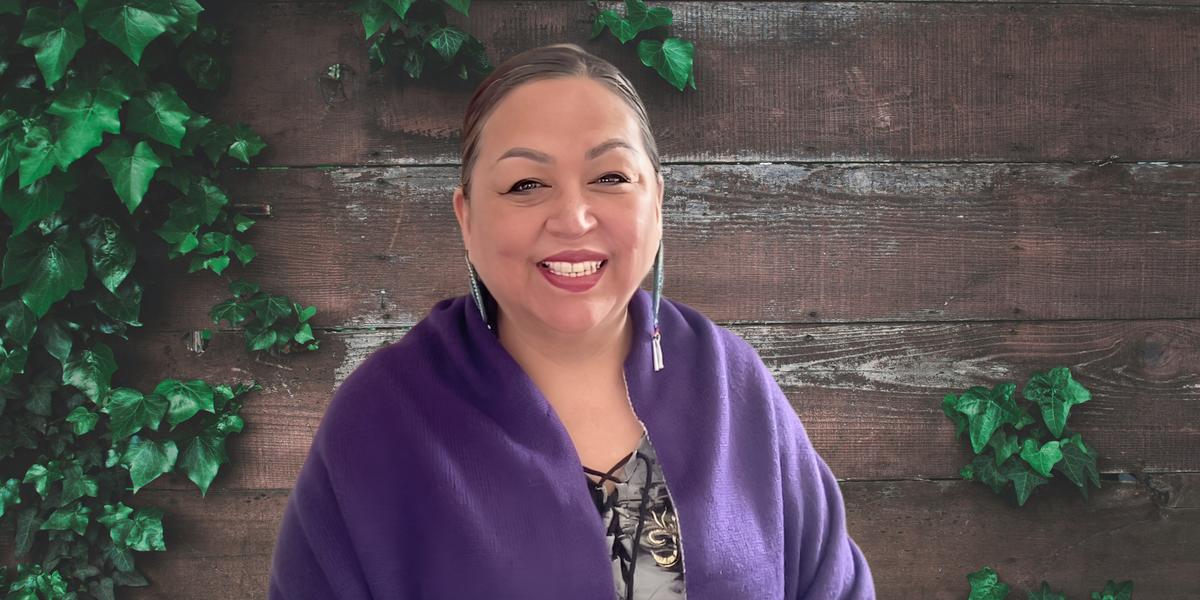When did you start at UMD?
I graduated from UMD in 2009 with a Master of Social Work. I came in 2019 as visiting faculty for 2 years and worked in that capacity. Then I moved to term faculty after that. In August, I started as director of the Center for Regional and Tribal Child Welfare Studies (CRTCWS).
I’ve always worked with the center, since 2019, advising and consulting and helping support a small portion of the curriculum development at the Tribal Training and Certification Partnership (TTCP).
I always maintained relationships with Indigenous folks at the university and always had good relationships with Dr. Day [social work professor emeritus] and Bree [former CRTCWS director]. Those were my center points in coming here. They asked me to apply and help support the future development of the center.
Why did you choose to work at UMD?
I was at a point in life where I was working as a sole business owner and I was ready to make a bigger commitment to an organization. This one fit. I always wanted to be in academia. I always wanted to touch more people with some of the teachings that I have. I wanted to do better for our Indigenous kids. Those were always my focus. If we can teach Indigenous and non-Indigenous folks how to work better with people, youth, families and community, I think I’m doing my job. It aligned well with my own mission in life. I think I have more opportunities to connect and make bigger, meaningful changes in this type of position.
UMD is a land grant organization. It is also part of the Anishinaabe nation. This university is part of a number of different universities that sit within that territory. With me being Anishinaabe, it was a good fit as well. For me to be able to offer teachings localized to our territory was particularly aligned with where I wanted to be in life.
What do you like most about your job?
I have such a wonderful team to work with. At the center, Karen is amazing. We're bringing on new people like Dr. Phillips to work on some of the projects. The Department of Social Work has a number of researchers and academics open to learning and knowing and including Indigenous ways of knowing in the curriculum and I really like that about our program. I think it's pretty unique. It allows for us to be inclusive and a leader in DEI. The whole college embraces that and I feel good about it.
What is your research and/or teaching focus?
I teach clinical content courses and American Indian content courses. My classes are challenging. I teach about different ways of knowing and different ways of being. It’s not like a typical UMD class because it’s coming from a different perspective.
I do a lot of the community engagement pieces with the ICWA Council. One of my favorite things is connecting with people who are working directly with the community. There are 11 tribes in MN we work with as well as the counties. We have a tribal state partnership team with county tribal partners and tribal courts.
This work is mostly around determining and helping develop best practices when working with American Indian children and families involved in the child welfare system. I work closely with TTCP as well doing some training and supportive ventures.
The three areas of research I focus on most are cultural attachment, Indigenous well-being and Indigenous child welfare practice.
As part of the center’s mission, we’re working in collaboration with tribal and state partners on research and teaching. The center used to be the training hub and since that has now moved to the TTCP the center is evolving.
Our mission and values haven’t changed but we’re now focusing more on research and trying to make connections between the department and college and the American Indian community. We’d like to bring more community participatory research to scholars at the university. All of it has the goal of creating better outcomes for youth, children and families through evidence-based best practices. Building different solutions grounded in culture for our children. To be a bridge between policy and program development and community so this practice-based work is validated in the world of academia.
Do you have any advice for students?
Learning about a different culture is hard. Just stick to it. Develop relationships with your professors. It’ll be challenging. It’ll make your brain feel like you’re growing because it’s a whole different way of knowing. Be patient with yourself and your community when learning. You’re learning about all the trauma in the past and how it carries forward. Be gentle with yourself and always be kind to Indigenous folks, they've been through enough already. When you go out into the workforce, make an extra effort with Indigenous people as a social worker.
What do you like to do in your free time?
I like to spend time with my family. I’m very family-oriented. I’ll often be with my grandkids or parents or husband—doing things together, like eating or going to the movies.
When family visits Duluth we do visitor touristy stuff like go to the mall, the harbor, the beaches or up the North Shore.
